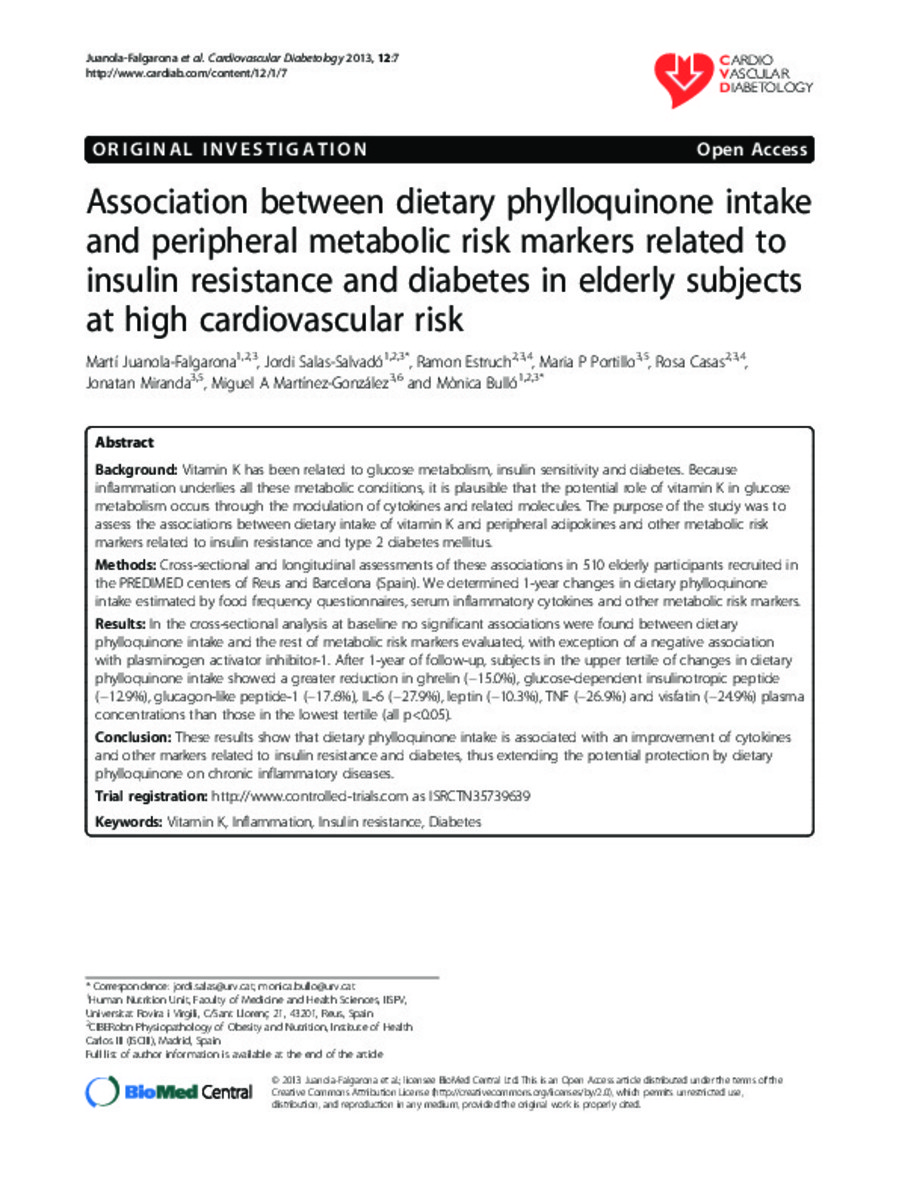Full metadata record
| DC Field | Value | Language |
|---|---|---|
| dc.creator | Juanola-Falgarona, M. (Martí) | - |
| dc.creator | Salas-Salvado, J. (Jordi) | - |
| dc.creator | Estruch, R. (Ramón) | - |
| dc.creator | Portillo, M.P. (María P.) | - |
| dc.creator | Casas, R. (Rosa) | - |
| dc.creator | Miranda, J. (Jonatan) | - |
| dc.creator | Martinez-Gonzalez, M.A. (Miguel Ángel) | - |
| dc.creator | Bullo, M. (Monica) | - |
| dc.date.accessioned | 2014-10-22T08:49:15Z | - |
| dc.date.available | 2014-10-22T08:49:15Z | - |
| dc.date.issued | 2013 | - |
| dc.identifier.citation | Juanola-Falgarona M, Salas-Salvado J, Estruch R, Portillo MP, Casas R, Miranda J, et al. Association between dietary phylloquinone intake and peripheral metabolic risk markers related to insulin resistance and diabetes in elderly subjects at high cardiovascular risk. Cardiovasc Diabetol 2013 Jan 8;12:7-2840-12-7. | es_ES |
| dc.identifier.issn | 1475-2840 | - |
| dc.identifier.uri | https://hdl.handle.net/10171/36877 | - |
| dc.description.abstract | BACKGROUND: Vitamin K has been related to glucose metabolism, insulin sensitivity and diabetes. Because inflammation underlies all these metabolic conditions, it is plausible that the potential role of vitamin K in glucose metabolism occurs through the modulation of cytokines and related molecules. The purpose of the study was to assess the associations between dietary intake of vitamin K and peripheral adipokines and other metabolic risk markers related to insulin resistance and type 2 diabetes mellitus. METHODS: Cross-sectional and longitudinal assessments of these associations in 510 elderly participants recruited in the PREDIMED centers of Reus and Barcelona (Spain). We determined 1-year changes in dietary phylloquinone intake estimated by food frequency questionnaires, serum inflammatory cytokines and other metabolic risk markers. RESULTS: In the cross-sectional analysis at baseline no significant associations were found between dietary phylloquinone intake and the rest of metabolic risk markers evaluated, with exception of a negative association with plasminogen activator inhibitor-1. After 1-year of follow-up, subjects in the upper tertile of changes in dietary phylloquinone intake showed a greater reduction in ghrelin (-15.0%), glucose-dependent insulinotropic peptide (-12.9%), glucagon-like peptide-1 (-17.6%), IL-6 (-27.9%), leptin (-10.3%), TNF (-26.9%) and visfatin (-24.9%) plasma concentrations than those in the lowest tertile (all p<0.05). CONCLUSION: These results show that dietary phylloquinone intake is associated with an improvement of cytokines and other markers related to insulin resistance and diabetes, thus extending the potential protection by dietary phylloquinone on chronic inflammatory diseases. TRIAL REGISTRATION: http://www.controlled-trials.com as ISRCTN35739639. | es_ES |
| dc.language.iso | eng | es_ES |
| dc.publisher | BioMed Central | es_ES |
| dc.rights | info:eu-repo/semantics/openAccess | es_ES |
| dc.subject | Vitammin K | es_ES |
| dc.subject | Inlfammation | es_ES |
| dc.subject | Insulin resistance | es_ES |
| dc.subject | Diabetes | es_ES |
| dc.title | Association between dietary phylloquinone intake and peripheral metabolic risk markers related to insulin resistance and diabetes in elderly subjects at high cardiovascular risk | es_ES |
| dc.type | info:eu-repo/semantics/article | es_ES |
| dc.identifier.doi | http://dx.doi.org/10.1186/1475-2840-12-7 | es_ES |
Files in This Item:
Statistics and impact
Items in Dadun are protected by copyright, with all rights reserved, unless otherwise indicated.






